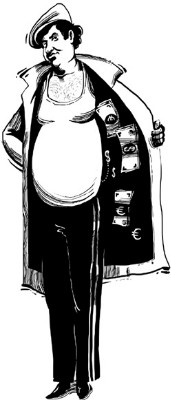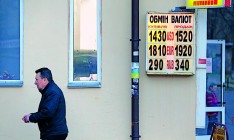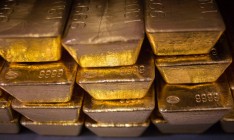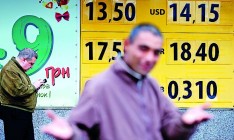Finance
rules of the gameThe NBU is forcing businesses and private entrepreneurs to resort to the hard currency black market

Every day it is becoming more difficult to legally buy U.S. dollars in Ukraine, though buying hard currency from profiteers is not a problem as they are willing to sell it in amounts much higher than the National Bank of Ukraine. However, moneychangers’ rate is UAH 1 – 2 higher than the official rate. Despite this, the circulation on the official market is in decline and the grey market is growing, as it is the latter which currently satisfied the demand of individuals and businesses for the currency.
Paying the price
In Ukraine there are several exchange rates of the national currency – the official rate set by the NBU, the interbank rate and the so-called black (or grey) market rate. A legal way for businesses to buy dollars or euros is requesting banks to buy the currency on the interbank foreign exchange market. But this is extremely difficult as the supply of hard currency is limited – neither banks, nor exporters want to sell it at the regulator’s “indicative” rate.
Another actual legitimate way to buy dollars or euros at an acceptable rate is on the NBU foreign exchange auction by submitting an application. However, the circle of potential recipients of the coveted currency is limited. On September 23 the NBU prohibited the use of foreign currency to settle import contracts without the delivery of goods or services to Ukraine.
Pre-payment terms were limited as well. “Advance payment is permissible, but a new regulation has been introduced: if you paid for a product or a service, it should be delivered or provided within 90 days,” explained head of the NBU press service Inna Hordiyenko. This way the NBU minimized the leakage of hard currency from the country, but the artificial restrictions are also wreaking havoc on legal businesses.
“The resolution of the NBU prohibiting advance payments for goods in hard currency deals a serious blow to the import of all commodities. Do you think European companies will agree to deliver goods to Ukraine without pre-payment? I have a feeling that the NBU does not understand how the economy works,” says Director for Alcohol Supplies at the Vitis Group Serhiy Mazur.
Even those who managed to submit an application to participate in the NBU auction often do not get any currency. “Sometimes we rejected customers’ applications because they presented illegitimate contracts,” said NBU Governor Valeria Hontareva. At the same time, the procedure for participation in the auction is the same for all bidders, confirms Chairman of the Board of Directors at Ukrgazbank Serhiy Mamedov. “We collect applications and pass them on to the NBU,” he says. “Many contracts indeed do not meet the requirements and terms of the auction”.
If it is difficult to buy currency legally, this does not mean that businesses will close shop. Representatives of companies engaged in the supply of goods for sale in Ukraine or for their own production reluctantly speak about places where they manage to buy dollars and euros.
General Director of the All-Ukrainian Association of Auto Importers and Dealers Oleh Nazarenko says that each importer has its own bank which helps to solve the problem. “It is like a marketing ploy, when everyone is seeking a way to sell more vehicles. All importers are competitors and if somebody found a loophole for buying foreign currency, it will be kept a secret,” he assured.
Web stores and online retailers pegging prices of their goods to the U.S. dollar are also cautiously discussing this topic. “We do not work with the currency,” confirmed founder of the Rozetka web store Vladyslav Chechetkin. Most online stores have removed values of their product in dollars from their websites due to the requirements of the law a long time ago. On those websites that did not remove prices in dollars it is quite easy to calculate the real exchange rate – close to UAH 14/US $1.
Traders of petroleum products also do not reveal the U.S. dollar exchange rate factored into their prices. President of the Association of Oil Market Operators of Ukraine Leonid Kosyanchuk says companies use the interbank dollar rate for assessment of their prices.
However, according to UPECO analyst Oleksandr Syrenko, real quotes to which companies are oriented are actually higher than those on the interbank exchange. “For the simple reason that operators buy currency from commercial banks after transactions on the interbank market. Importers pay an additional 20–30 kopecks for each dollar,” says Syrenko. Even in this situation the market can cope with the purchase of expensive dollars, says the expert. “Unfortunately, operators cannot buy the required amount of currency on the interbank market. Practically all major importers faced such a problem,” says the analyst.
That is why sellers of petroleum products are guided by the price at which they can purchase hard currency when calculating the dollar exchange rate. “At present, it is very difficult to buy hard currency officially, which pushes companies to the black market,” said a manager of a wholesale company that sells petroleum products. He said that last week market players based their prices on the rate of UAH 14.5/US $1. This week the rate dropped to UAH 13 – 14/US $1.
Small wholesale importers need € 10,000 – 20,000 for the purchase of goods on a weekly basis, says a director of a company specializing in the import of construction components, who asked not to be named. This means that every month a small importer needs € 50,000 – 100,000 or even more. “Sometimes the currency is needed very quickly. There is no time to wait until financial institutions buy something for you on the interbank market. But the difference with the official exchange rate is quite substantial – if you buy € 100,000, the commission for the intermediary will be UAH 200,000,” says the source. As a result, the company is forced to include the difference in the exchange rate in the cost of goods or cut its own earnings.
At the same time, on www.minfin.com.ua and www.finance.ua U.S. dollar supplies are currently ranging at the rates from UAH 14.15 - 14.70/US $1, depending on the amount of the potential transaction. And often representatives of various banks interested in selling their currency not through cash registers, but at a higher price on the black market are hiding behind offers from individuals. So far, the NBU does not know how to deal with illegal currency exchange operations. Law enforcement agencies cannot find a solution either.
Currency raids
“I cannot say that the NBU can defeat the black market, but we are doing our best,” says Hontareva with no particular enthusiasm. Financial experts admit that the problems should be resolved globally based on the practices and experiences of other countries, for example, by reducing the number of cash transactions, says Mamedov. “30 – 50% of the money circulate out of the budget, so why are we surprised that we have two or three exchange rates,” said the banker.
Nevertheless, for now the NBU prefers to take administrative measures. A week ago, upon the initiative of the central bank, officials created an interdepartmental working group, which includes some representatives of the Prosecutor General’s Office, the State Security Service, the Interior Ministry, the State Service of Financial Monitoring and the State Fiscal Service, and experts of the NBU. “We will only be able to obstruct the functioning of the illegal black market with the help of law enforcers. We monitor contracts and shut down “dirty” banks, but the demand for hard currency remains and flows into the black market. If you refuse to sell hard currency to a customer believing that the contract is intended for the withdrawal of money from the country, where will such a client go?” asks Hontareva.
For now it is impossible to obtain specific information from the law enforcers. Representatives of the press service of the SBU advised Capital to pose this question to the Ministry of Internal Affairs. The latter gave no response to the publication’s inquiry. On Monday, the ministry's website reported that in cooperation with the NBU the MIA “followed the leads on activities of illegal currency exchange outlets”.
“We started taking action in the nation’s capital,” the statement reads. The statement clarifies that law enforcers search for illegal and semi-legal currency exchange outlets, as well as individuals engaged in illegal operations. It is surprising that law enforcers cannot find money changers, although in big cities the places where they huddle can easily be found. In the meantime, the NBU penalizes commercial banks engaged in hard currency speculations. On October 1 the NBU excluded four financial institutions from participation in a foreign exchange currency auction, accusing them of currency manipulations, though it did not disclose their names.
So far, all these measures have not produced any results. Moreover, it is becoming increasingly difficult to buy hard currency legally as commercial banks have not had it in the public domain for a long time. Due to the outflow of deposits, commercial banks in Ukraine are forced to buy huge amounts of foreign currency to settle accounts with their depositors.
All those who were not fortunate enough to buy dollars and euros officially have become customers of the shadow market. Lately, the daily traded value on the interbank market typically does not exceed US $300 – 400 mn. On October 6, an anti-record was achieved – the total amount of transactions reached US $192 mn, while in October 2013 the daily traded value of hard currency on the interbank market amounted to approximately US $1 bn. The difference between these two figures gives an approximate idea of the scale of the problem that the NBU must resolve.






 of the agreement of syndication with Financial Times Limited are strictly prohibited. Use of materials which refers to France-Presse, Reuters, Interfax-Ukraine, Ukrainian News, UNIAN agencies is strictly prohibited. Materials marked
of the agreement of syndication with Financial Times Limited are strictly prohibited. Use of materials which refers to France-Presse, Reuters, Interfax-Ukraine, Ukrainian News, UNIAN agencies is strictly prohibited. Materials marked  are published as advertisements.
are published as advertisements.